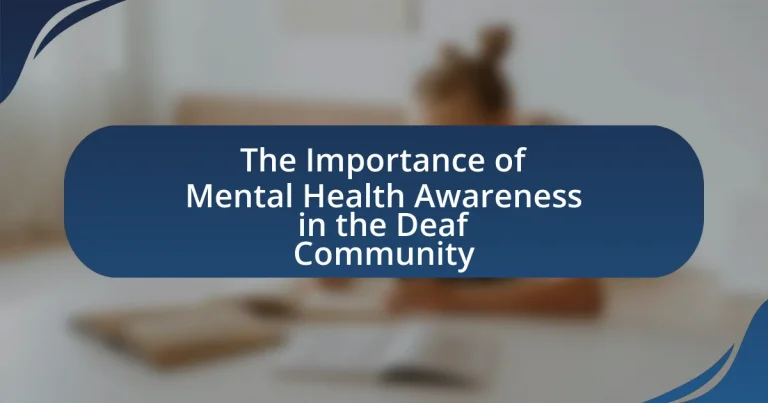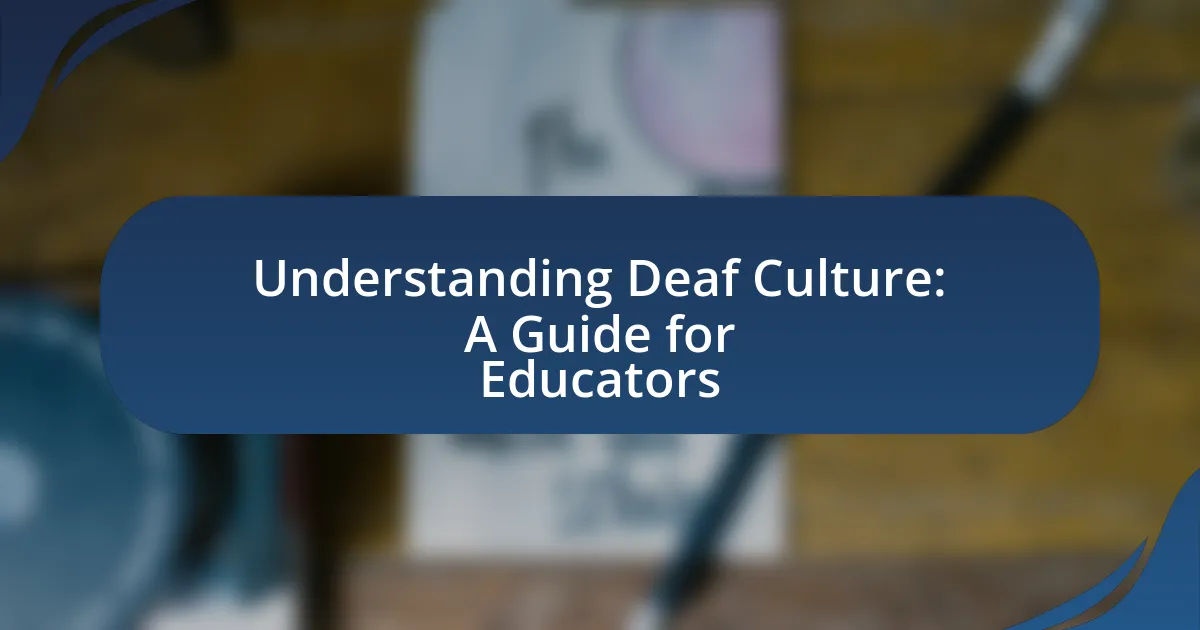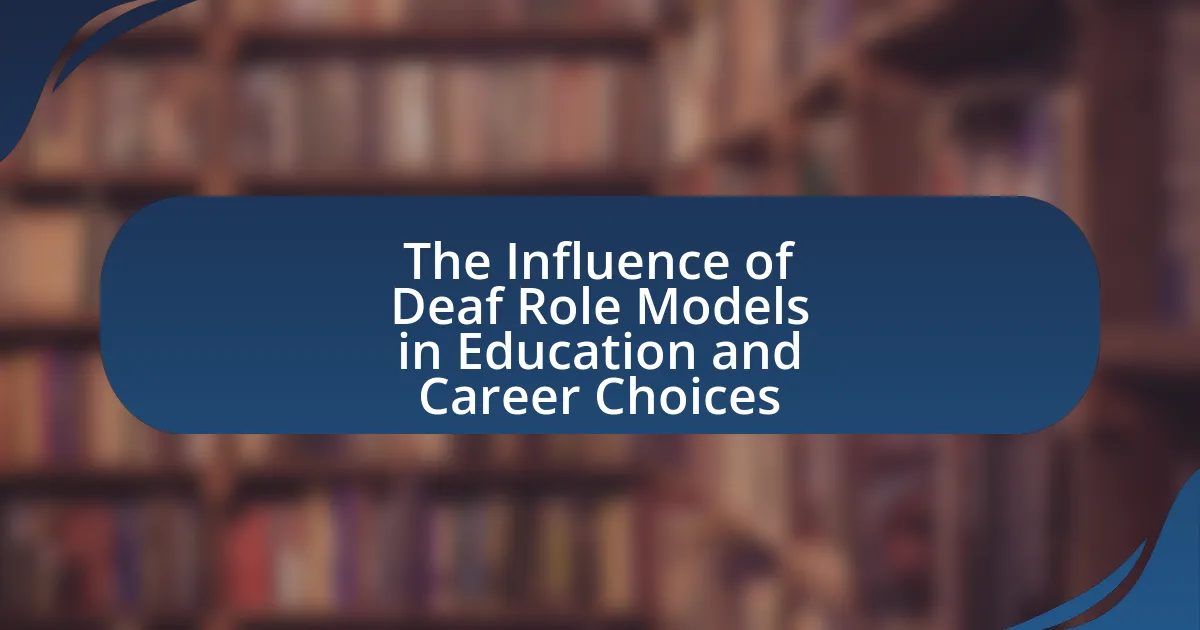Mental health awareness is essential in the Deaf community due to unique challenges such as communication barriers and social isolation, which can lead to higher rates of depression and anxiety. Research indicates that approximately 40% of Deaf individuals experience mental health issues, often exacerbated by stigma and inadequate access to resources. Effective communication access, culturally competent services, and targeted educational programs are crucial for improving mental health outcomes. This article explores the importance of mental health awareness, the specific challenges faced by the Deaf community, and strategies to enhance support and resources tailored to their needs.
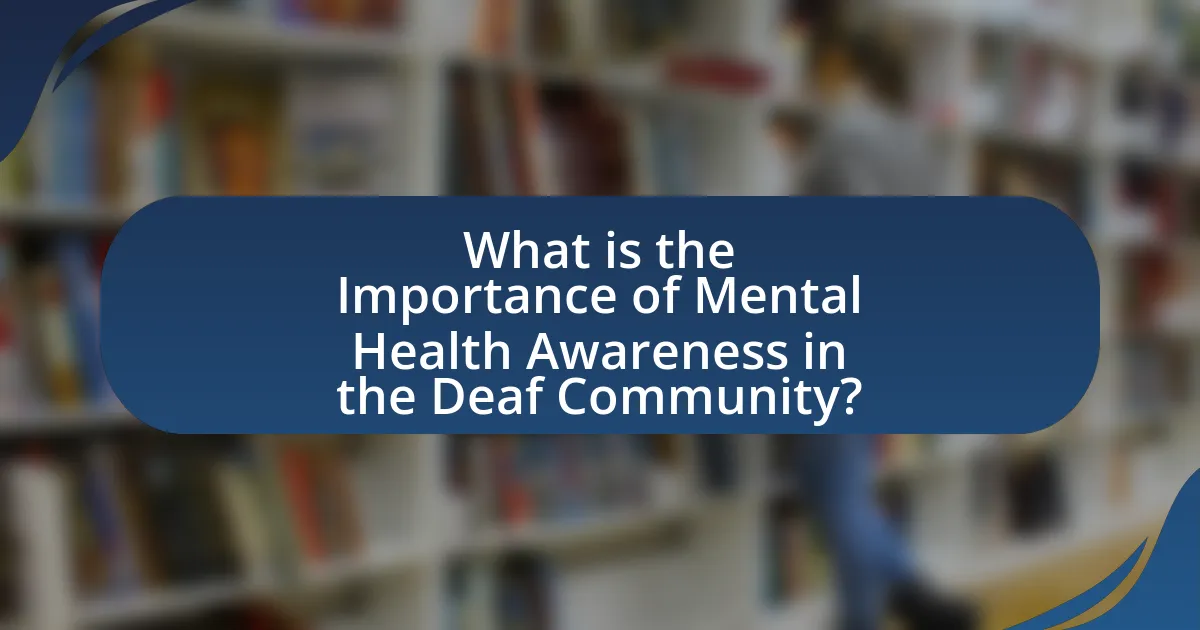
What is the Importance of Mental Health Awareness in the Deaf Community?
Mental health awareness is crucial in the Deaf community because it addresses unique challenges such as communication barriers and social isolation that can exacerbate mental health issues. Research indicates that Deaf individuals experience higher rates of depression and anxiety compared to hearing individuals, often due to stigma and lack of access to appropriate mental health resources. For instance, a study published in the Journal of Deaf Studies and Deaf Education found that 40% of Deaf individuals reported experiencing mental health problems, highlighting the need for targeted awareness and support initiatives. By promoting mental health awareness, the Deaf community can foster understanding, reduce stigma, and improve access to mental health services tailored to their specific needs.
Why is mental health awareness crucial for the Deaf community?
Mental health awareness is crucial for the Deaf community because they face unique challenges that can exacerbate mental health issues, such as social isolation and communication barriers. Research indicates that Deaf individuals are at a higher risk for mental health disorders, with studies showing that they experience depression and anxiety at rates significantly higher than their hearing counterparts. For instance, a study published in the Journal of Deaf Studies and Deaf Education found that 40% of Deaf individuals reported experiencing mental health issues, highlighting the need for targeted awareness and support initiatives. By promoting mental health awareness, the Deaf community can better access resources, reduce stigma, and foster a supportive environment that addresses their specific needs.
What unique challenges does the Deaf community face regarding mental health?
The Deaf community faces unique challenges regarding mental health, primarily due to communication barriers, social isolation, and stigma. Communication barriers can hinder access to mental health services, as many providers may not be fluent in sign language, leading to misunderstandings and inadequate care. Social isolation often results from a lack of accessible social networks and support systems, which can exacerbate feelings of loneliness and depression. Additionally, stigma surrounding both deafness and mental health can prevent individuals from seeking help, as they may fear discrimination or lack of understanding from hearing individuals. Research indicates that Deaf individuals are at a higher risk for mental health issues, with studies showing that they experience higher rates of depression and anxiety compared to their hearing counterparts.
How does communication access impact mental health awareness in the Deaf community?
Communication access significantly enhances mental health awareness in the Deaf community by facilitating the exchange of information and resources. When Deaf individuals have access to effective communication methods, such as sign language interpreters or captioning services, they are more likely to engage with mental health resources, participate in discussions, and seek help when needed. Research indicates that improved communication access leads to higher rates of mental health service utilization among Deaf individuals, as evidenced by a study published in the “American Journal of Public Health,” which found that Deaf individuals with access to interpreters reported a 50% increase in seeking mental health services compared to those without such access. This correlation underscores the critical role that communication plays in promoting mental health awareness and support within the Deaf community.
What are the consequences of neglecting mental health in the Deaf community?
Neglecting mental health in the Deaf community leads to increased rates of depression, anxiety, and social isolation. Research indicates that Deaf individuals often face unique stressors, such as communication barriers and societal stigma, which can exacerbate mental health issues. A study published in the Journal of Deaf Studies and Deaf Education found that Deaf individuals are at a higher risk for mental health disorders compared to their hearing counterparts, highlighting the critical need for targeted mental health support. Furthermore, untreated mental health conditions can result in diminished quality of life, impaired functioning, and increased healthcare costs, underscoring the importance of addressing mental health proactively within this community.
How can untreated mental health issues affect the quality of life for Deaf individuals?
Untreated mental health issues can significantly diminish the quality of life for Deaf individuals by exacerbating feelings of isolation and limiting access to necessary support systems. Deaf individuals often face unique challenges, such as communication barriers and societal stigma, which can intensify mental health struggles. Research indicates that Deaf individuals are at a higher risk for depression and anxiety compared to their hearing counterparts, with studies showing that approximately 40% of Deaf individuals experience mental health issues, often stemming from social exclusion and lack of accessible mental health resources. This lack of treatment can lead to further complications, including decreased social engagement, impaired relationships, and overall reduced life satisfaction.
What role does stigma play in mental health perceptions within the Deaf community?
Stigma significantly influences mental health perceptions within the Deaf community by perpetuating negative stereotypes and discouraging individuals from seeking help. This stigma often arises from a lack of understanding about mental health issues and the unique challenges faced by Deaf individuals, such as communication barriers and social isolation. Research indicates that Deaf individuals may experience higher rates of mental health disorders, yet they are less likely to access mental health services due to fear of discrimination and misunderstanding from hearing professionals. For instance, a study published in the Journal of Deaf Studies and Deaf Education found that Deaf individuals reported feeling marginalized and misunderstood in mental health settings, which further exacerbates their mental health challenges.
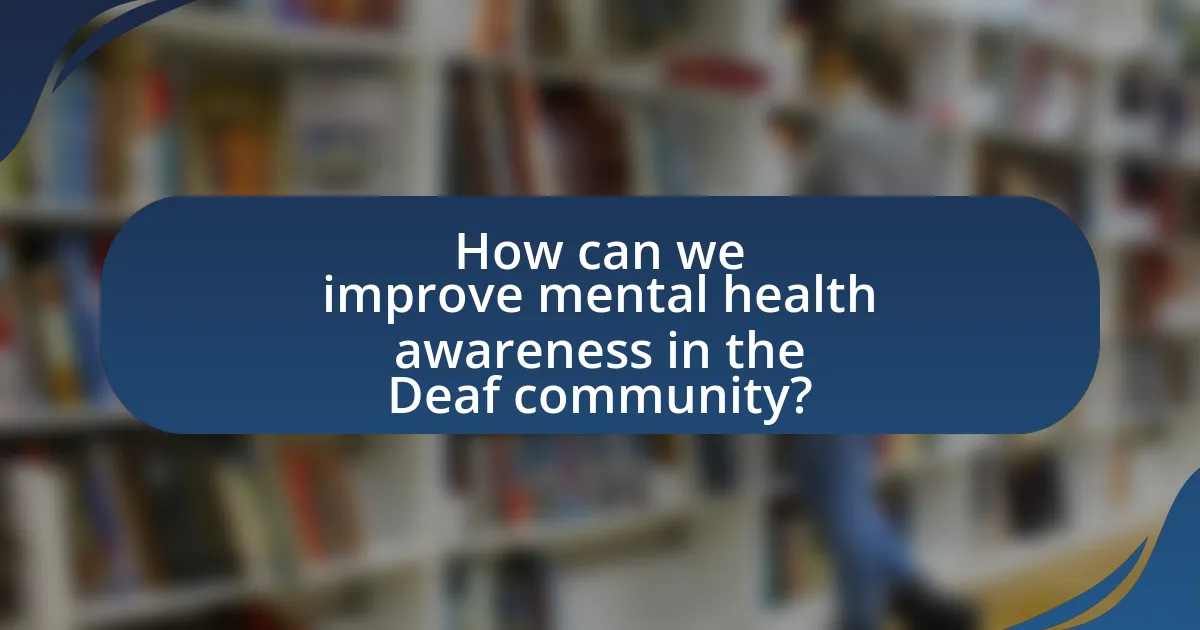
How can we improve mental health awareness in the Deaf community?
To improve mental health awareness in the Deaf community, it is essential to provide accessible mental health resources and education tailored to Deaf individuals. This can be achieved by developing materials in sign language and ensuring that mental health professionals are trained in Deaf culture and communication. Research indicates that Deaf individuals often face barriers to accessing mental health services, with a study by the National Institute on Deafness and Other Communication Disorders highlighting that 70% of Deaf individuals report feeling misunderstood by healthcare providers. By implementing community workshops, utilizing social media platforms in sign language, and collaborating with Deaf organizations, awareness can be significantly enhanced, leading to better mental health outcomes.
What strategies can be implemented to raise awareness?
To raise awareness about mental health in the Deaf community, implementing targeted educational programs is essential. These programs should focus on providing accessible information about mental health issues, tailored specifically for Deaf individuals, using sign language and visual aids. Research indicates that culturally relevant materials significantly enhance understanding and engagement, as evidenced by a study published in the Journal of Deaf Studies and Deaf Education, which found that Deaf individuals are more likely to seek help when information is presented in their native language. Additionally, community workshops and events can foster open discussions about mental health, reducing stigma and encouraging individuals to share their experiences. Collaborating with Deaf organizations to promote these initiatives can further amplify their reach and effectiveness.
How can educational programs be tailored for Deaf individuals?
Educational programs can be tailored for Deaf individuals by incorporating sign language as the primary mode of communication and ensuring accessibility through visual aids. Research indicates that Deaf students perform better in environments where instruction is delivered in sign language, as it aligns with their natural communication preferences (Marschark, 2003). Additionally, programs should include culturally relevant content that addresses the unique experiences of Deaf individuals, particularly regarding mental health issues, to foster a supportive learning environment. Implementing these strategies can enhance engagement and comprehension, ultimately leading to improved educational outcomes for Deaf students.
What role do Deaf organizations play in promoting mental health awareness?
Deaf organizations play a crucial role in promoting mental health awareness by providing tailored resources and support specifically for the Deaf community. These organizations facilitate access to mental health services through advocacy, education, and outreach programs that address the unique challenges faced by Deaf individuals, such as communication barriers and social isolation. For instance, the National Association of the Deaf (NAD) actively works to raise awareness about mental health issues within the Deaf community by offering workshops and informational materials in American Sign Language (ASL). This approach ensures that Deaf individuals receive relevant information in a language they understand, thereby increasing their engagement with mental health resources.
How can technology aid in mental health awareness for the Deaf community?
Technology can significantly aid in mental health awareness for the Deaf community by providing accessible resources and communication tools. For instance, mobile applications designed for mental health support can offer features like sign language interpretation, visual content, and text-based communication, making information more accessible. Research indicates that 90% of Deaf individuals prefer visual communication, which highlights the importance of technology that caters to their needs. Additionally, online platforms can facilitate peer support groups and mental health education tailored specifically for Deaf individuals, enhancing their understanding and awareness of mental health issues.
What tools and resources are available for Deaf individuals seeking mental health support?
Deaf individuals seeking mental health support can access various tools and resources specifically designed for their needs, including sign language interpreters, mental health apps with accessibility features, and specialized counseling services. Organizations such as the National Association of the Deaf provide resources and referrals to mental health professionals who are fluent in sign language. Additionally, online platforms like BetterHelp offer services that cater to Deaf clients, ensuring effective communication. Research indicates that culturally competent care significantly improves mental health outcomes for Deaf individuals, highlighting the importance of these tailored resources.
How can telehealth services be adapted for the Deaf community?
Telehealth services can be adapted for the Deaf community by incorporating sign language interpreters and providing visual communication options. This adaptation ensures that Deaf individuals can effectively engage with healthcare providers through video calls or chat features that support American Sign Language (ASL) or other sign languages. Research indicates that access to interpreters in telehealth settings significantly improves patient satisfaction and health outcomes for Deaf patients, as highlighted in a study published in the Journal of Telemedicine and Telecare, which found that 90% of Deaf participants preferred video consultations with interpreters over traditional methods.
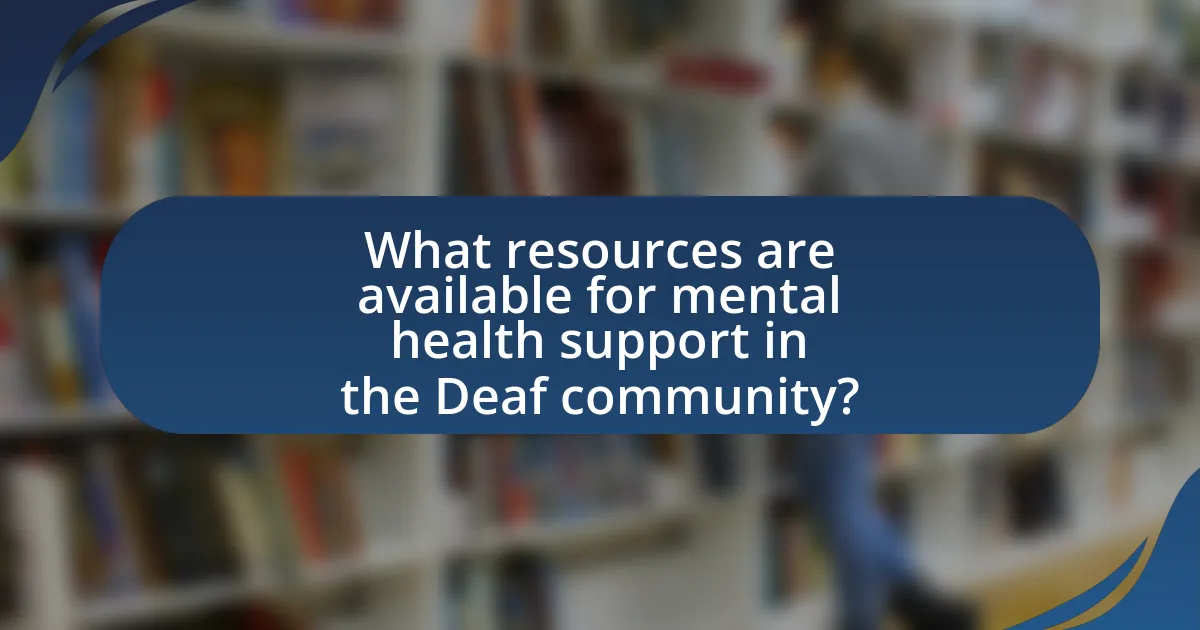
What resources are available for mental health support in the Deaf community?
Mental health support resources for the Deaf community include specialized counseling services, peer support groups, and mental health hotlines that offer communication in sign language. Organizations such as the National Association of the Deaf (NAD) and the Deaf Wellness Center provide tailored mental health services and resources specifically designed for Deaf individuals. Research indicates that Deaf individuals face unique mental health challenges, often exacerbated by communication barriers and social isolation, highlighting the need for accessible support systems.
What types of mental health services are specifically designed for Deaf individuals?
Mental health services specifically designed for Deaf individuals include culturally competent therapy, sign language interpreters in therapy sessions, and mental health support groups tailored for Deaf communities. These services address the unique communication needs and cultural experiences of Deaf individuals, ensuring effective treatment. Research indicates that Deaf individuals often face barriers in accessing mental health care, highlighting the necessity for specialized services that incorporate sign language and Deaf culture to improve mental health outcomes.
How can Deaf individuals access culturally competent mental health professionals?
Deaf individuals can access culturally competent mental health professionals by seeking providers who are fluent in sign language and trained in Deaf culture. Research indicates that mental health outcomes improve when practitioners understand the unique experiences and communication needs of Deaf clients. For instance, a study published in the “American Journal of Public Health” highlights that culturally competent care significantly enhances trust and engagement in therapy among Deaf individuals. Additionally, organizations such as the National Deaf Therapy Association provide directories of qualified professionals, ensuring that Deaf individuals can find accessible and culturally sensitive mental health support.
What community resources exist to support mental health in the Deaf community?
Community resources that support mental health in the Deaf community include specialized counseling services, peer support groups, and mental health hotlines that offer services in sign language. Organizations such as the National Association of the Deaf (NAD) and the Deaf Counseling Center provide tailored mental health resources and advocacy specifically for Deaf individuals. Research indicates that Deaf individuals face unique mental health challenges, and access to culturally competent services is crucial for effective support. For example, a study published in the Journal of Deaf Studies and Deaf Education highlights the importance of accessible mental health services in improving outcomes for Deaf individuals.
What best practices can enhance mental health support for the Deaf community?
Best practices that can enhance mental health support for the Deaf community include providing accessible communication methods, employing qualified interpreters, and creating culturally competent mental health services. Accessible communication methods, such as sign language and visual aids, ensure that Deaf individuals can express their feelings and understand therapeutic concepts effectively. Employing qualified interpreters trained in mental health contexts facilitates clear communication between clients and providers, reducing misunderstandings that can hinder treatment. Additionally, culturally competent mental health services that recognize the unique experiences and challenges faced by the Deaf community foster trust and engagement, leading to better mental health outcomes. Research indicates that culturally tailored interventions significantly improve the effectiveness of mental health support for marginalized groups, including the Deaf community.
How can family and friends support Deaf individuals facing mental health challenges?
Family and friends can support Deaf individuals facing mental health challenges by fostering open communication and understanding their unique needs. Effective support includes learning sign language or using visual communication methods to ensure clear dialogue, which is crucial for expressing feelings and concerns. Research indicates that social support significantly impacts mental health outcomes; for instance, a study published in the Journal of Deaf Studies and Deaf Education found that strong social networks can alleviate feelings of isolation often experienced by Deaf individuals. Additionally, family and friends should educate themselves about mental health issues specific to the Deaf community, as this knowledge can help them provide informed support and advocate for appropriate resources.
What are effective communication strategies for discussing mental health with Deaf individuals?
Effective communication strategies for discussing mental health with Deaf individuals include using sign language interpreters, ensuring visual clarity, and employing clear, concise language. Sign language interpreters facilitate accurate communication, allowing Deaf individuals to express their thoughts and feelings without barriers. Visual clarity, such as maintaining eye contact and using appropriate lighting, enhances understanding. Additionally, using clear and straightforward language minimizes confusion and ensures that the message is conveyed effectively. Research indicates that effective communication significantly improves mental health outcomes in Deaf populations, as evidenced by studies showing that accessible communication leads to better engagement in mental health services.
